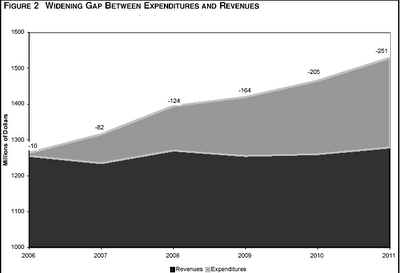Throwing Employees to the Wolves
Among the bills is one to make Health Savings Accounts (HSAs) deductible from state income tax (AB 4). Senator Alberta Darling (R-River Hills) has put out a press release urging an override of this bill, which she cosponsored. And the special interest behemoth Wisconsin Manufacturers and Commerce has also joined the push to override the veto and make HSAs tax-exempt in the state.
I've written before why HSAs alone are a bad idea. There are two main issues with health care: 1) cost and 2) the uninsured. HSAs concentrate on cost, but they're not about reducing cost -- they're intended to shift costs.
By making HSAs tax-exempt it allows employers to push them onto employees by claiming they're a tax-free way to save for health care. This is a problem for a couple reasons.
One, it increases the use of high-deductible, low-premium health plans because employers can argue that the HSA is intended to help the employee pay for the higher deductible. Since employers typically pay for the majority of the premium while employees pay for the deductible, HSAs serve employers well. But the actual cost of the care is not being reduced; rather, it's just being shifted to the deductible and, hence, the employee.
Two, HSAs encourage people to "shop around" for their care. The Bush administration and other Republicans tout this as a benefit because people will be able to seek out the best deal for their HSA buck. However, when you're in need of health care is not the best time to be a consumer. If consumers choose not to buy an iPod because they don't want to shell out the money, for instance, all they're out is a portable music player. People who are sick, on the other hand, don't have the option not to receive good health care, unless they want their sickness to not get any better or potentially lead to something worse. In a time when the US is already far behind on instituting proactive health care measures, adding second-guessing to the system in terms of whether to get medical aide is not desirable.
Admittedly, health care costs are becoming a significant burden for employers and if nothing is done they will simply stop providing it for employees. Yet, employees aren't in any better position to handle the rising costs of health care -- in fact, they're position is arguably much worse.
And the alternative to HSAs does not need to be nothing.
Comprehensive health care reform is the only way to effectively deal with the issue of cost. I've written before on that topic numerous times (here, here, here, here, and here), so I won't go into it much in this post. Suffice to say, the only way to effectively reduce costs is to reduce the number of payers in the system.
And once overall costs are reduced, HSAs could actually be a useful tool. Under the comprehensive health care proposal made by Sen. Russ Decker (D-Schofield) and Rep. Terry Musser (R-Black River Falls) last month, for example, recipients would be responsible for an annual deductible of $600 for families or $300 for individuals. An HSA could be set-up to allow recipients to bank money the previous year to pay for their health care deductible the subsequent year.
As long as costs are controlled and, subsequently, recipients stand a chance at being able to afford directly paying for all necessary care, HSAs can be useful tools.
Without reducing costs first, however, instituting the widespread use of HSAs amounts to nothing more than throwing employees to the wolves.
UPDATE: The override vote for AB 4 failed in the Assembly today. The vote was 61-36.








